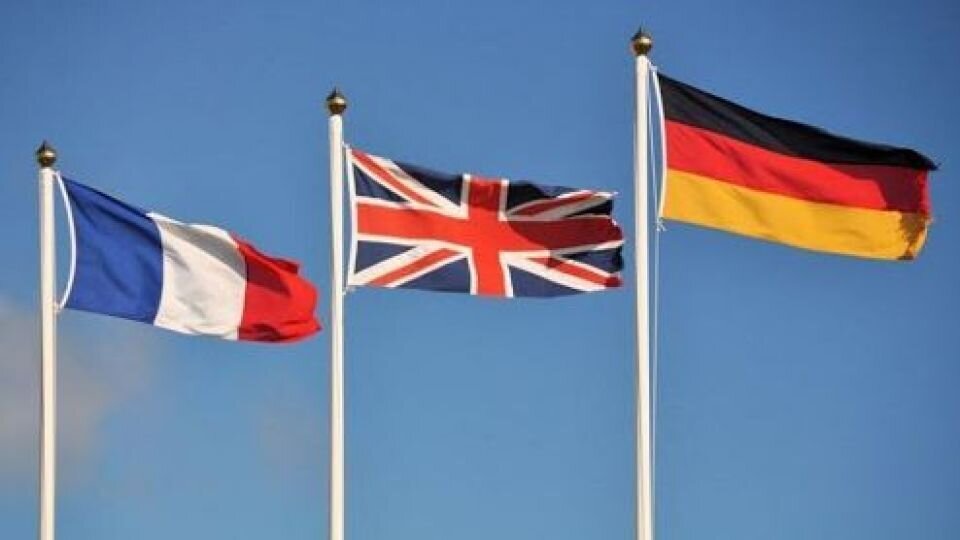

TEHRAN – The UK, France and Germany, the three European countries which are still party to the 2015 nuclear (JCPOA), delivered a joint statement to the IAEA on Wednesday addressing Iran’s implementation of its obligations under its NPT Safeguards Agreement.
The statement by the E3 followed after IAEA Director General Rafael Grossi met with Atomic Energy Organization of Iran (AEOI) chief Mohammad Eslami in Tehran on March 5.
On the same day, the IAEA and Iran issued a joint statement agreeing on closer cooperation.
Following is the text of the statement posted on gov.uk/government on Wednesday, March 9:
France, Germany, and the United Kingdom thank Director-General Grossi for his report on the implementation of safeguards in Iran, contained in GOV/2022/5.
We fully support and commend the IAEA for its professional, independent and impartial verification of Iran’s safeguards obligations, and its efforts to fully clarify information concerning the correctness and completeness of Iran’s declarations under its NPT Safeguards Agreement. We re-emphasise the importance of the IAEA continuing to evaluate all safeguards-relevant information available, in line with its mandate.
It is in this context that we note the recent Joint Statement between the IAEA and the AEOI which aims to “accelerate and strengthen their cooperation and dialogue aimed at the resolution of the issues” as mentioned in details in the Director General’s report contained in GOV/2021/52. We strongly urge Iran to now seize this opportunity and fully cooperate with the IAEA after more than two years without substantive engagement. Iran needs to provide the technically credible information, documentation and answers that the Agency deems necessary without any delay, as it is legally obliged to do so.
We reject any public suggestion there is a “political solution” to these issues – the Agency must be able to perform its technical mandate free of political pressure. We remain as committed as ever to upholding the Agency’s independence. It is only through Iran’s full and substantial technical co-operation with the IAEA that the Director General would be able to report these issues have been clarified and resolved and are no longer outstanding.
The E3 deeply regret that – despite repeated calls by Board members and the June 2020 resolution adopted by the Board of Governors – these safeguards issues have neither been clarified nor has Iran declared related nuclear material, equipment, activities or locations. These are not merely issues of the past: these are about the present and the future, the integrity of the safeguards regime. Indeed, as the DG has repeatedly reported, the Agency had found indications that nuclear material had been present at three undeclared locations. The whereabouts of this nuclear material are still unknown to the Agency. It is essential that the IAEA be able to fully account for nuclear material as per its mandate.
We take note of the Agency`s assessment that it has “no additional questions on the issue related to Location 2 and, therefore, that this issue could be considered as no longer outstanding at this stage”. We re-emphasize that legally Iran is legally obliged to declare all nuclear activities and clarify them in a complete manner.
The Comprehensive Safeguards Agreement, together with the Additional Protocol, present the current verification standard. We remain deeply concerned that Iran has stopped applying the Additional Protocol more than a year ago. We urge Iran to fulfil its obligations under the CSA and to reapply and ratify the Additional Protocol as soon as possible.
This would be an important confidence-building step. It is also a necessary condition for the IAEA to eventually reach the Broader Conclusion that all nuclear material in Iran remains in peaceful uses.
We recall that implementation of the Modified Code 3.1 is a legal obligation for Iran under the Subsidiary Arrangement to its Comprehensive Safeguards Agreement which cannot be modified or stopped unilaterally.
The E3 take note that there have been no further instances of intimidation of IAEA inspectors in Iran since the last report. We reaffirm that the Director General should provide further updates if this situation changes. In addition, we call on Iran to provide the necessary written clarifications requested in the Agency’s letter dated 16 November 2021.
Recalling the resolution adopted by the Board in June 2020 upon our initiative, we will follow the implementation of the Joint Statement closely and encourage the Director General to continue reporting to the Board of Governors, as appropriate. We would welcome making this report contained in GOV/2022/5 public.
Related posts:
Views: 0
 RSS Feed
RSS Feed

















 March 10th, 2022
March 10th, 2022  Awake Goy
Awake Goy  Posted in
Posted in  Tags:
Tags: 
















